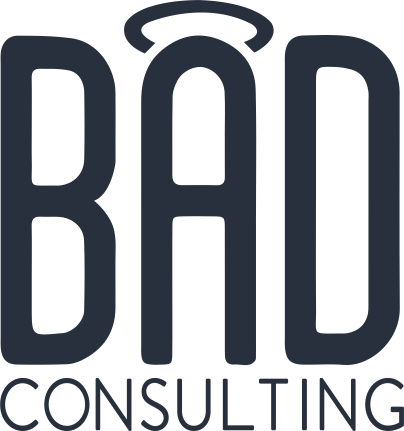If you’re anything like me, you’re probably a people pleaser. You want to be graded and you want that A+. And you want everyone to be happy. The idea of saying no to a client gives you diarrhea. Wait, is that one just me? Whatever. Let’s move on.
Not being able to say no to a client is going to keep them completely in the driver seat with no checks. That means they’ll scope creep and direct the social media strategy to only consider the organization’s needs rather than the audience’s. It’s not good for them as an organization or for you as their social media consultant. That’s always made it a little easier for me to say no.
Ready to find out when you should say no?
Let’s start with what to do when they say no back to you
I have one big rule in my business: I don’t care if you tell me no, as long as you listen to my reasons why you are wrong. As long as you hear me, go and do what you want. Or have me do what you want.
Why do I do this? In the end, it’s their business. As long as they are using me appropriately as their social media advisor, then it’s their decision on how to proceed. I am not aware of every single aspect of their business after all. I just know about what touches social media. Knowing my place in their business makes situations where I’m told no so much easier.
But on the other hand, if they’re telling me no with no interest in hearing me out, then it’s probably time for me to start moving on. I’m not being used in an advisory role and just expected to post whatever the client wants. I’m not going to post anything I’m proud of, and there are social media consultants who cost a whole lot less than me whose skill sets are better for the client. It’s honestly best for both of us if I start making an exit plan.
Scope creep
When it comes to doing more than you are contracted for, it’s a good idea to say no even if it feels super uncomfortable. Why? This is going to take away from your earning potential as it will require more of your time. That means you will be less likely to make an appropriate wage and less likely to stay in business. It sets you up for burn out and less creative work, which is bad for all of your clients.
Keeping healthy boundaries, on the other hand, sets you up to create better content. So if a client stars creeping out of your scope, don’t be afraid to say, “This is outside of what I am contracted to do. Per our contract, this is how much it will cost if you want me to move forward with it.” They will have one of three responses. The first is obviously the favorite: They will say obviously you are right and accept the rate. Remind yourself that this is totally possible.
The second response is that they’ll thank you for that information and keep the work in-house. This is great as well. It keeps your time free so you can go after other work. And they may come back to you because they can’t handle the work in-house.
The third is the response we’re all afraid of. If they come back and say you should just do the work for free, stand your ground. Point to your contract and say that you want to present your best work for them. It will be uncomfortable and it will be hard. But putting up this boundary will help you in the long run. And if they are still pressuring you, you need to find a new client. This one doesn’t respect you and will continue to cause problems that you don’t need.
Bad social media practices
This is one that I try to limit even if a client listens to me and says do it anyway. And usually that’s easy enough by pointing to my contract and saying it’s out of my scope. But every once in awhile it happens that something comes up.
So how do I say no to a bad social media practice? I do my best to educate my clients as we go along, so when something like this comes up, I can rely on that education that I have given them. But not every client takes to that education. That means I have to start from scratch every time something that can hurt them comes up.
I had one client contact who never listened to the education I tried to give them and was not up on the latest marketing trends either. The client contact before that was the exact opposite, so to say I had a bit of whiplash would be an understatement. This person decided on doing a social media strategy based on made-up holidays, despite how many times I told them that this wasn’t a great practice and would eventually annoy their audience. Every time one of these made-up holidays came up, I was once again in this fight. It honestly got tiring to constantly say no.
So for me, if you are just saying no every so often and you feel like your client is listening to you, keep going. If it’s constant and there is no listening, it’s not worth your mental health. Find someone who values you and your expertise.
Not planning
Social media marketing is by the seat of your pants, they say. You have to be of the moment, they say. First off, they are wrong. There is a lot of planning and research that goes into great social media. Even some of the ones that look like it’s on the fly, it’s not. A great social media manager just knew how to put the work in so things could happen fast or it just looks like it happened fast.
Not planning and doing everything at the last minute gets you into this reactive mode. You’re just constantly putting out fires and you aren’t able to look at the big picture of what needs to happen. It’s a great way to get away from business goals.
Over my career, I’ve been accused of being selfish and making it about me when I’ve asked clients to plan. It was the complete opposite, but that was my first clue that it was time to move on from a client.
With me, my clients plan three months for general topics, events, etc. We then go into one month for getting content ready for execution. And we tie up any loose ends the week before. It’s a constant cycle, and it keeps us constantly going in a productive way. Some consultants like to do six months in advance, but that has always felt like too much for my clients.
Does that mean that we don’t ever go on-the-fly? Absolutely not. Trends happen and breaking news comes up. But overall, the strategy is to plan. And if a client can’t accept my no about constantly going without a plan, they’re not the right client for me or for most consultants.
Saying no can be the scariest thing you can do as a social media consultant. It’s not only because of the response your client will give, but it can be because of what it might reveal about your client. If they don’t respect you and your expertise, knowing it’s time to move on can create a lot of uncertainty in your life. In the end, it can be a necessary step and can move you forward.
What have you said no to? How has it benefited you?

